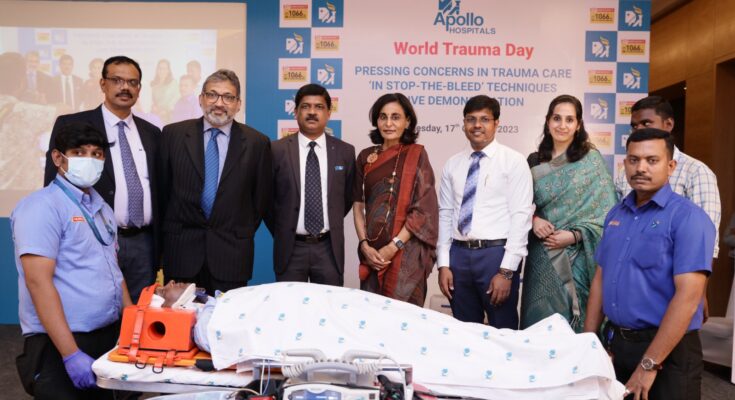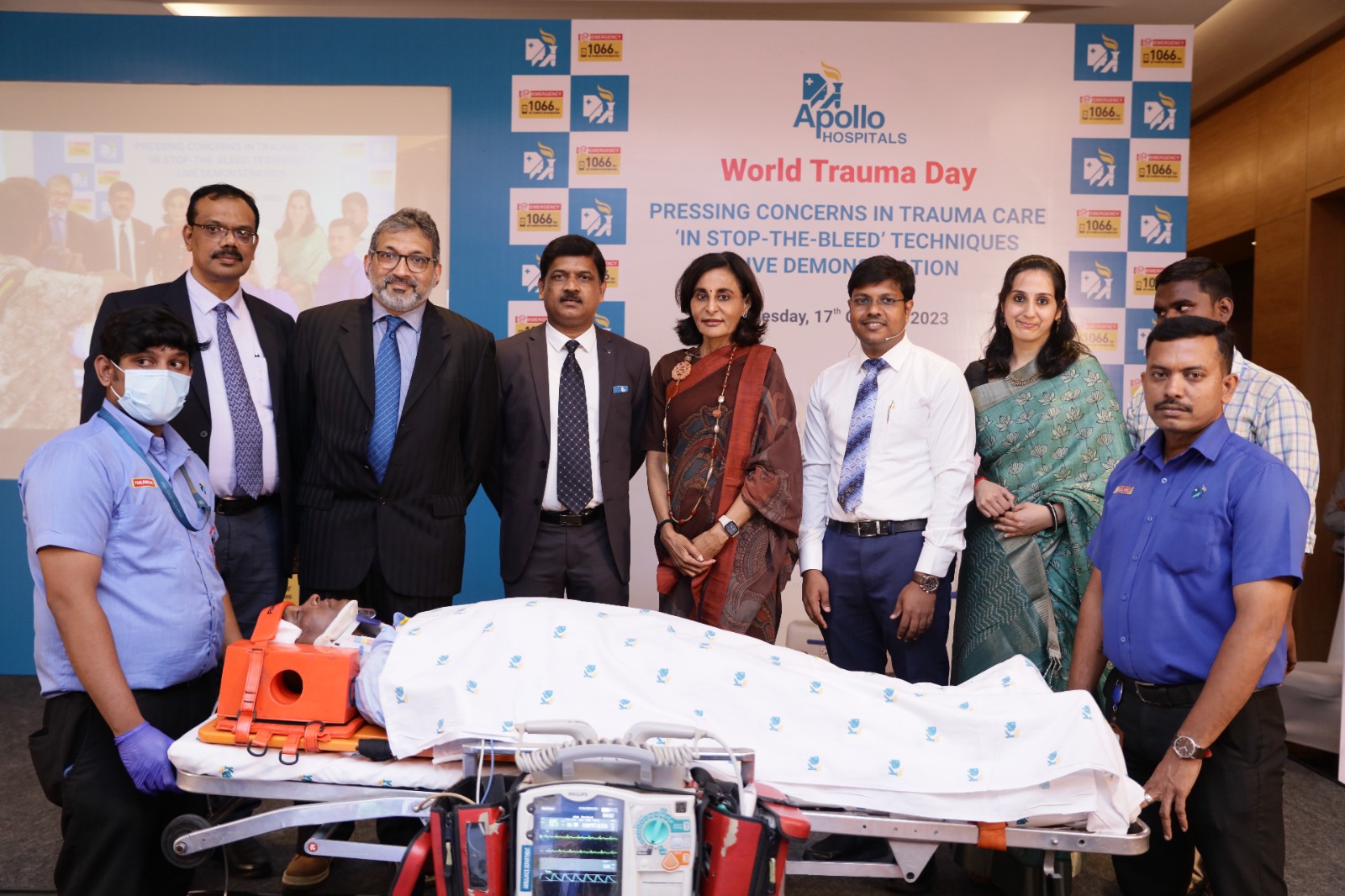Apollo Hospitals calls for awareness on Stop the Bleed Techniques on World Trauma Day
** Over 400 people die in road traffic-related accidents in India every day
** Experts flag rise in geriatric trauma cases, say elderly are vulnerable
**Stop the Bleed Techniques hailed as time-saving and life-saving by medical community
Chennai, 17 October 2023 : In an effort to raise consciousness around trauma response and sensitize the public about care during injuries relating from various accidents, Apollo Hospitals has called for greater awareness on Stop The Bleed techniques. A team of doctors from the Emergency Services Unit of Apollo Hospitals made the clarion call for awareness about the globally recognized set of life-saving procedures on the occasion of World Trauma Day today.
The team of doctors also performed a live demonstration to spread the message around Stop The Bleed techniq ues — a special set of protocols for bystanders who are responding to a medical emergency. The team highlight ed that the intervention will help control bleeding and save time, before trained professionals arrive on the sce ne and take over. In essence, the intervention will empower bystanders in accident cases to play a key role durin g the critical first hour and save a life.
The doctors also flagged the rise in geriatric trauma cases and highlighted that the elderly are more susceptible to trauma-related injuries. Therefore, they report more falls at the ground level, slips and other concerns from similar events. The elderly are also on blood-thinning medications – this contributes greatly to their susceptibility.
Suneetha Reddy, Managing Director, Apollo Hospitals Group, said, “Apollo Hospitals has emerged as a leading pr ovider in the critical care and emergency services space. For starters, we have a team of skilled doctors, able first responders and dedicated support staff who are equipped to deal with a complex case load from across geograp hhies. We have also expanded our offerings and invested in cutting-edge technologies and infrastructure to deal with a range of trauma and poly-trauma cases. Our ambulance services 1066 are state-of-the-art and a key part of our emergency response efforts. While we as a healthcare provider are constantly keeping pace with develop ments in this space and upskilling our staff, we also call upon the public to become aware of Stop The Bleed tech niques and help create a more trauma-responsive community.”
L to R – Dr Babu Abraham, Senior Consultant, Multi-Disciplinary Critical Care Unit, Apollo Hospitals; Dr. Senthil Kumar, Senior Consultant Multi-Disciplinary Critical Care Unit Apollo Hospitals; Ms Suneeta Reddy, Managing Director, Apollo Hospitals Group; Dr Baskar Dhanapal, Consultant, Department of Emergency, Apollo Hospitals; Dr. Madhu, Consultant, Emergency medicine department, Apollo Hospitals
Dr Senthil Kumar, Senior Consultant, Multi-Disciplinary Critical Care Unit, Apollo Hospitals, said, “We at Apollo Hospitals see World Trauma Day as an important occasion for us to create awareness around appropriate traum a response by all stakeholders. The Stop The Bleed Techniques are global standards for not just trained medical personnel but also lay people who may be required to respond to a variety of accident cases in the vicinity and b eyond. We are treating a significant number of people with injuries from road accident cases. We are also seeing a rise in geriatric trauma cases — the elderly as a category are more susceptible and require our enduring suppor t in their recovery journeys. There is thus an urgent need for us take cognizance of these developments and resp ond effectively as a community. Stop The Bleed is our special call to action. Our mission is to save lives and awar eness is the key.”
Middle and low-income countries such as India account for 90% of all road traffic deaths. More than 400 people die every day due to road accidents in India. According to a World Bank Report of 2021, India accounts for 11% of global road deaths, with 53 road crashes occurring every hour. According to data provided by the AIIMS Trau ma Centre, temporary or permanent disability affects almost 50% of all survival cases, though the mortality rat es are logged at 2% – 3% of the total cases. The first seven months this year registered a total of 9,875 road accid ent victims.
About Apollo Hospitals :
It was in 1983, that Dr Prathap C Reddy made a pioneering endeavor by launching India’s first corporate hospital – Apollo Hospitals in Chennai. Now, as Asia’s foremost trusted integrated healthcare group, its presence includes over 12,000 beds across 72 Hospitals and 5000 pharmacies, over 400 Primary Care clinics and 1228 Diagnostic c entres, 700 plus Teleclinics, over 15 medical education centres and a Research Foundation with a focus on global Clinical Trials. The most recent investment was the commissioning of South East Asia’s very first Proton Therapy Centre in Chennai.
Every four days, the Apollo Hospitals Group touches a million lives, in its mission to bring healthcare of internati onal standards within the reach of every individual. In a rare honour, the Government of India had issued a com memorative stamp in recognition of Apollo’s contribution, the first for a healthcare organization. Apollo Hospit als Chairman, Dr Prathap C Reddy, was conferred with the prestigious Padma Vibhushan in 2010.
For 40 years, the Apollo Hospitals Group has continuously excelled and maintained leadership in medical innova tion, world-class clinical services and cutting-edge technology. Its hospitals are consistently ranked amongst the best hospitals in the country for advanced medical services.






